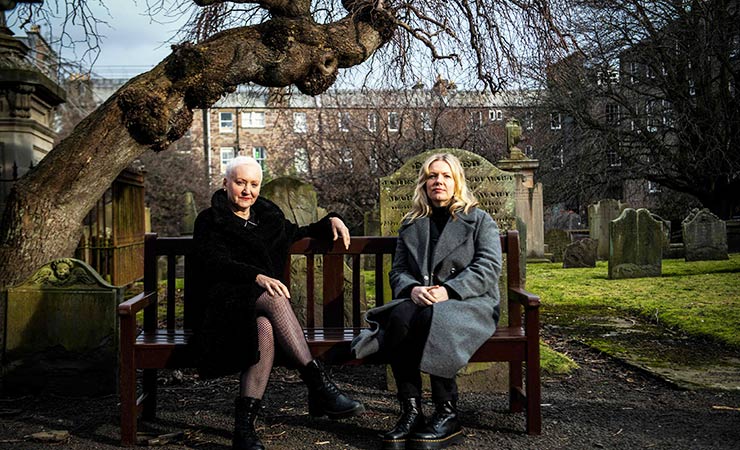It seems Scotland is coming home to Labour


Scottish Labour leader Anas Sarwar with candidate Michael Shanks after Labour won the Rutherglen and Hamilton West by-election, at South Lanarkshire Council Headquarters in Hamilton. File/Associated Press
In its way the Rutherglen and Hamilton West by-election is every bit as significant for Labour as the recent results in Uxbridge and in Selby. It’s more than in line with general polling trends. It’s like a reset to the old days of Labour dominance. Labour will be making the most of it. So they should.
The by-election suffered from a fairly poor turnout (37.2 per cent), not helped by the new rules on photo ID, amounting to suppression of the franchise. The SNP vote may have been disproportionately affected by that: and it was certainly extra-depressed because of the special circumstances that triggered the poll: the disgrace of former SNP MP Margaret Ferrier, found guilty of breaking lockdown rules. Still, Starmer should frankly be elated, and deserves a large Scotch. Labour is vitally dependent on making substantial progress in Scotland to help ensure it forms a majority government after the next general election. This is further evidence it is on course — though there’s a long way to go. The Labour party has never taken a seat from the SNP in a by-election, so this is an historic first. But it matters also for psychological reasons. It shows Labour is making a comeback in a nation it used to “own”, and, unfortunately, so much so that it bred fatal complacency. Labour “won” every UK general election in Scotland between 1964 and the meltdown in 2015, when they were crushed by the SNP. Nor was that quite the nadir of Scottish Labour’s fortunes.
At the 2019 general election, Labour slumped to a vote share of 18.6 per cent, its lowest ever, and it finished third to the Conservatives. It returned one MP, where once it could rely on sending a contingent of around 30 to 50 south to help keep the Tories out. There would have been no Labour victories in the British general elections of 1964, February 1974 and 2005 without that Scottish parliamentary wedge. And, of course, Scottish Labour produced some of Labour’s greatest talents — Gordon Brown, John Smith, Robin Cook and Donald Dewar, not to mention Keir Hardie (Ramsay MacDonald remains problematic).
It’s not clear exactly why the SNP moved the writ for the by-election when they did, and thus gave Labour the gift of a great story of revival in one of its lost heartlands on the very eve of their last conference before the general election. It was simply a perfect battleground for Labour. It is in the former stronghold of the central belt, but unlike some other long lost seats, it was already a marginal, having been Labour as recently as 2017-19, and eminently winnable. It was also ideal in the psephological sense that Labour became the depository of protest votes against Conservative administration in Westminster, and the SNP at Holyrood. And there were Tory and Liberal votes to squeeze. It all came together in Rutherglen (translates as “red glen”, by the way). So Labour have scored a stonking victory. After all, the last time such a by-election came up, at Airdrie and Shotts in 2021, the SNP actually increased their vote share, though there was a reasonable 5 per cent swing to Labour, helped by apparently heavy tactical voting for Labour by (pro-Union) Conservatives and Liberal Democrats.
With the Tory and Lib Dem now losing their deposit in Rutherglen, it seems tactical voting is going to be a more pronounced feature at the next general election — especially to Labour’s advantage. In any case, it turns out that Labour will indeed have a splendid prize to parade around the conference centre in Liverpool in the coming days — the newly elected Labour MP for Rutherglen and Hamilton West, Michael Shanks — with well over half the poll. At a stroke he doubles the party’s Scottish representation in the Commons, and points to a much brighter future for Labour at Westminster and at Holyrood. The SNP’s extraordinary sustained dominance of the Scottish scene seems over, and with it much chance of a second independence referendum. For what it’s worth, it will put SNP leader Humza Yousaf under more pressure, but there doesn’t seem much point for them in having another leadership crisis just now.
Who knows, the SNP might even lose power in Edinburgh in 2026, with the controversy about Nicola Sturgeon’s leadership dragging on their ratings. Could Anas Sarwar become the next first minister with a Labour win after two decades of declining fortunes? He must dare to hope. Without being fanciful, the Rutherglen result might also signal that the people of Scotland are so heartily fed up with their English Tory government in Westminster that they’ve decided to get them out sooner rather than later by putting Labour in, as opposed to waiting for independence. The SNP argument, sometimes indelicately put, is that Labour and Conservatives are just two cheeks of the same, erm, bottom — both pro-Brexit and pro-cuts in social security.
Yet it doesn’t appear to have quite the potency that they’d like, even though Scottish voters are generally to the left of their English counterparts, and much more “European”. But the mood to get the Tories out is strong. It looks like Scotland, or at least enough of it, is coming home to Labour.







